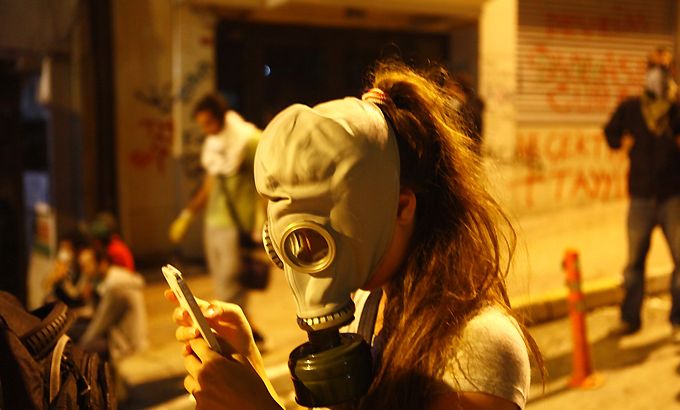Turkey protests continue for fourth day
Riot police fire tear gas to disperse crowds in Istanbul and Ankara as PM accuses “dissidents” of inciting protests.

Riot police are back on the streets of Turkey’s largest city, Istanbul, as anti-government protests continue for a fourth night in several cities.
Thousands of people gathered on Monday in the city’s central Taksim Square, where protests prompted by redevelopment plans for the area began last week.
Al Jazeera’s Anita McNaught said a helicopter with a searchlight was hovering over the crowds and a tear-gas canister had been thrown into the square, raising tension where protests during the day were peaceful with protesters waving flags, dancing and chanting slogans.
A few kilometres away, police fired tear gas to disperse protesters massing near Prime Minister Recep Tayyip Erdogan’s office in the city centre and the nearby stadium of Besiktas football team.
Referring to the protesters in Istanbul, our correspondent said: “They are determined to keep ‘speaking the truth’ to the government. They say the government is acting in an authoritarian manner, ruling by decree and not listening to the people.”
Police also clashed with protesters in the capital, Ankara, from where Al Jazeera’s Idil Gungor reported that police fired tear gas and used pressurised water against demonstrators who chanted slogans.
Most of the people in the crowd were secondary-school students, she said.
Medical sources say hundreds of people have been injured in four days of clashes, and rights groups have accused police of using excessive force.
Erdogan said on Monday the situation in Turkey was “now calming down” and accused political “dissidents” of inciting the protests.
“On my return from this visit, the problems will be solved,” he said in Rabat, Morocco. “The Republican People’s Party [CHP] and other dissidents have a hand in these events.”
Erdogan is set to return to Turkey on Thursday after an official four-day tour of North Africa.
“Today the people on the street across Turkey are not exclusively from the CHP, but from all ideologies and from all parties,” Mehmet Akif Hamzacebi, a senior party member, said.
Speaking to Al Jazeera, Fadi Hakura, a Turkey analyst at the Chatham House think-tank in London, said: “I think that the prime minister has really adopted a really defiant and confrontational approach towards the protests taking place in Istanbul and across Turkey. He has already accused them of being extremists; he has suggested there’s a link between the protesters and foreign plotters.”
The unrest first erupted on Friday when trees were torn down at a park in Taksim Square under government plans to redevelop the area, but widened into a broad show of defiance against the governing, Islamist-rooted AK Party.
Erdogan has overseen a transformation in Turkey during his decade in power, turning its once crisis-prone economy into the fastest-growing in Europe.
He remains by far Turkey’s most popular politician, but critics point to what they see as his authoritarianism and religiously conservative meddling in private lives in the secular republic.
Tighter restrictions on alcohol sales and warnings against public displays of affection in recent weeks have also provoked protests.